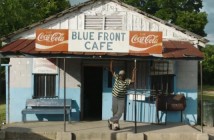
Editor’s Notes: Zootopia is currently open in wide theatrical release.
Disney may have ceded the title of family-friendly animation champion to Pixar more than a decade ago (Disney smartly purchased Pixar around the same time), but its transition into computer animation, despite several setbacks and roadblocks, has placed it firmly, if not always comfortably, in second place thanks in no small measure to the involvement of Pixar mastermind John Lasseter. Under Lasseter’s sound, steady guidance, Disney animation has made substantial strides visually and narratively. Something previously unheard of, let alone imagined, a Disney-made film (e.g., Frozen, Wreck-It Ralph, Tangled) matching, if not exceeding, Pixar’s best has begun to happen with increasing, increasingly predictable frequency. Rich Moore, the director of Wreck-It Ralph, co-directed Disney’s latest foray into animated storytelling, Zootopia, a neo-noir/police procedural with – what else? – talking, bipedal animals at the center of a relatable, resonant story spiked with contemporary relevance.
. . . talking, bipedal animals at the center of a relatable, resonant story spiked with contemporary relevance.
The Zootopia of the title is a gleaming, modernist metropolis, a shining city on a hill, the home to vast multitudes, prey and predator alike. They’ve evolved beyond mere instinct and biology, setting aside their differences to live in virtual harmony, virtual because inter-species cooperation isn’t complete. If it was, there’d be no need for law enforcement, but there is, suggesting a world not far from our own, imperfect, yet the best one possible, at least until Zootopia’s hero-cop, Judy Hopps (voiced by Ginnifer Goodwin), graduates from the police academy, an overachiever with top-of-her-class honors and a dream to make the world a better place. Trouble is, she’s a rabbit and in the world/universe of Zootopia, rabbits resemble their real-world counterparts: They’re smaller, much smaller than most of the other animals. Outside of speed and quickness, they’re at a distinct, physical disadvantage. That doesn’t stop Judy from following her dream in classic Disney fashion, but she has obstacles, primarily of the prejudiced, stereotypical kind (gender and the equivalent of racism, speciesism).

While Judy’s ready to take down criminals and prove herself worthy of her badge, her immediate superior, Chief Bogo (Idris Elba), thinks otherwise. He sees her as an example of tokenism, of a well-meaning, well-intentioned policy of inclusion that’s only going to lead to Judy’s embarrassment, humiliation, or worse. As a result, Bogo relegates Judy to meter-maid duty. Judy, of course, responds by setting a seemingly impossible ticketing quota for herself and promptly meeting it. Along the way, she’s conned by a wily, con-artist fox, Nick Wilde (Jason Bateman), who fully embraces the stereotypes associated with his species. When, however, Judy learns about unsolved disappearances in Zootopia, she volunteers, seemingly setting her up for failure, especially after Bogo gives her a 48-deadline (find a missing otter or turn in her badge if she doesn’t). Smartly using Nick’s con-artist skills and his contacts in the semi-criminal world, Judy proves herself an able detective police procedural style.
Thematically, Zootopia fully embraces inclusion and diversity, rejecting isms (e.g., sexism, racism) wholeheartedly, though the message, however straightforward and unsubtle, does get a little muddled when the question of biology . . .
Zootopia includes several extended chase scenes/set pieces, each one both meticulously rendered and expertly choreographed, but as with all chase scenes/set pieces, each one feels obligatory, sometimes even perfunctory, shoehorned into the screenplay at regular intervals to keep audiences, young and adult, adequately engaged. As expected for a family-oriented film, Zootopia’s story isn’t particularly complicated, though Zootopia’s three credited directors and screenwriting team throw in major nods to The Godfather and Breaking Bad, plus story elements borrowed or influenced by Chinatown and Who Framed Roger Rabbit? before seguing to the usual mix of verbal, pun-heavy humor and physical slapstick. To the filmmakers’ credit, Zootopia, both the city and the world outside the city, are beautifully, imaginatively rendered, though a cynic would suspect that Zootopia’s ecosystems, Sahara Square, Tundratown, the Rainforest District, and Little Rodentia, are nothing but ready-made theme-park ideas. Maybe, but they do serve an important narrative function, paralleling real-world, self-segregated ethnic neighborhoods (among other things).
Thematically, Zootopia fully embraces inclusion and diversity, rejecting isms (e.g., sexism, racism) wholeheartedly, though the message, however straightforward and unsubtle, does get a little muddled when the question of biology, especially as to how it applies to predators, becomes central to solving the mystery of the disappearing mammals. Depth and nuance are also in short supply. On the other hand, life lessons are everywhere for anyone looking for them. Preteens won’t care, adults might end up bored or possibly annoyed with Zootopia’s heavy-handed, unsubtle approach to delivering its pro-tolerance message. For right-leaning moviegoers, boredom and annoyance will likely give way to a far stronger emotional reaction. Then again, they can certainly find corroboration of their political views in the ubiquitous conservative candidates running to replace Barack Obama as president of the United States next January.
Zootopia includes several extended chase scenes/set pieces, each one both meticulously rendered and expertly choreographed, but as with all chase scenes/set pieces, each one feels obligatory, sometimes even perfunctory, shoehorned into the screenplay at regular intervals to keep audiences, young and adult, adequately engaged.



